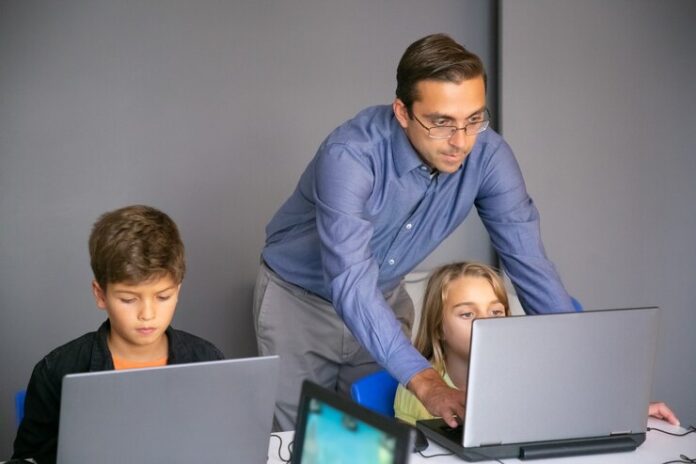In today’s fast-paced digital world, coding has become an important ability for children. With the rise of technology and the increasing demand for tech-savvy professionals, introducing kids to coding at an early age can lay a solid foundation for their future careers. One of the most accessible and engaging ways to begin their coding journey is through HTML and CSS. These languages serve as the perfect starting point for kids coding introduction to HTML, CSS, and JavaScript, offering a fun and interactive way for children to learn the basics of web development. This article will explore why HTML and CSS are ideal for kids and how they can help children develop problem-solving skills, creativity, and a deeper understanding of technology.
Top Courses in Programming Language
1. Simple and Visual Learning Process
HTML (HyperText Markup Language) and CSS (Cascading Style Sheets) are both relatively easy to understand compared to other programming languages. HTML provides a simple structure for creating web pages, while CSS is used to style those pages. Together, they offer an intuitive learning experience for kids.
Unlike more complex programming languages, HTML and CSS are visual and provide instant feedback. Children can see their work come to life right away by creating and styling their web pages. The ability to see their code transformed into a visually appealing result helps boost their confidence and keeps them engaged. This immediate feedback loop is especially important for kids who are just beginning their coding journey, as it allows them to grasp the concepts quickly and stay motivated.
Moreover, kids coding introduction to HTML, CSS, and JavaScript helps them understand how websites and applications are built. As they continue to learn, they can experiment with different HTML tags, styles, and layouts, fostering a deeper understanding of web development and design.
2. Creativity and Personal Expression
HTML and CSS are perfect tools for children to express their creativity. HTML enables them to structure content in creative ways, while CSS allows them to experiment with different colors, fonts, layouts, and animations. By learning these languages, kids can create their websites, blogs, or even digital art projects that reflect their unique personalities and ideas.
The hands-on experience of building a website helps children realize that coding is not just about numbers and algorithms—it’s also about design and creativity. This combination of logic and artistic expression makes HTML and CSS an ideal choice for kids, as it provides a balanced learning experience.
In addition, kids coding introduction to HTML, CSS, and JavaScript encourages children to think outside the box. By exploring different possibilities for layout and design, they can develop a sense of aesthetics and user experience (UX), skills that are valuable not only in coding but in other areas of life as well.
3. Foundational Skills for Future Learning
HTML and CSS serve as the foundation for more advanced programming languages, including JavaScript. By starting with these languages, kids can gradually build the skills necessary to move on to more complex coding challenges. Once they are comfortable with the structure and design aspects of web development, they can dive into the world of interactivity and dynamic functionality using JavaScript.
Moreover, learning HTML and CSS helps children develop logical thinking, attention to detail, and problem-solving skills—qualities that are useful not only in programming but also in school and other areas of life. These fundamental skills provide a strong base for kids to advance their knowledge of coding, making it easier for them to understand more sophisticated programming languages in the future.
When children begin with HTML and CSS, they can gain confidence in their coding abilities and take on more challenging tasks as they progress. This gradual approach ensures that kids are not overwhelmed and can build on their knowledge step by step.
4. A Gateway to Web Development and Tech Careers
As children learn HTML and CSS, they are also learning key concepts used by web developers around the world. These skills can serve as a stepping stone to future careers in web development, design, and other tech-related fields. HTML and CSS are in high demand in the job market, and by teaching kids these skills early, we are helping them develop expertise that can be valuable in the future.
Moreover, web development is a field that is both exciting and full of opportunities. As children learn HTML and CSS, they can experiment with creating their websites, games, and apps, giving them a sense of ownership and pride in their work. This not only fuels their passion for coding but also motivates them to explore further career opportunities in technology.
Check out our latest article: Emerging Trends in Hybrid Mobile App Development
5. Free and Accessible Learning Resources
Another reason why HTML and CSS are perfect for kids is the abundance of free and accessible learning resources. Platforms like easyshiksha.com offer engaging courses designed to teach children the fundamentals of coding through HTML, CSS, and JavaScript. These courses often feature interactive tutorials, quizzes, and hands-on projects that make learning fun and interactive.
Additionally, children can access countless tutorials, coding challenges, and coding communities online. These resources make it easier than ever for kids to learn at their own pace and explore different aspects of web development. By learning HTML and CSS, kids can gain the skills needed to create their own web pages or start personal coding projects that are meaningful to them.
6. Supportive Online Communities
Another benefit of starting with HTML and CSS is the vast online community of coders and learners. Websites like easyshiksha.com provide a space for kids to collaborate, share their projects, and receive feedback from others. These communities offer a supportive environment where children can learn from their peers, ask questions, and grow as developers.
Being part of an online coding community also teaches kids the importance of teamwork, communication, and collaboration—skills that will serve them well in both the tech industry and other fields. By working on group projects or participating in coding challenges, kids can build their problem-solving abilities and gain a sense of camaraderie with others who share their interests.
 Online Education Magazine in India, EasyShiksha Magazine
Online Education Magazine in India, EasyShiksha Magazine
Get Courses: the complete microsoft onedrive course
Conclusion
In conclusion, HTML and CSS are the perfect starting point for kids learning to code. These languages are easy to understand, visually rewarding, and serve as the foundation for more advanced programming concepts. By introducing children to kids coding introduction to HTML, CSS, and JavaScript, we can help them develop important skills like creativity, logical thinking, and problem-solving while also providing them with a gateway to future career opportunities in web development and technology.
Platforms like easyshiksha.com offer excellent resources for kids to explore coding in a fun and interactive way. With the right guidance and resources, kids can learn HTML and CSS and start their journey in the exciting world of coding, preparing them for a future filled with opportunities and success.







































.jpg)




























